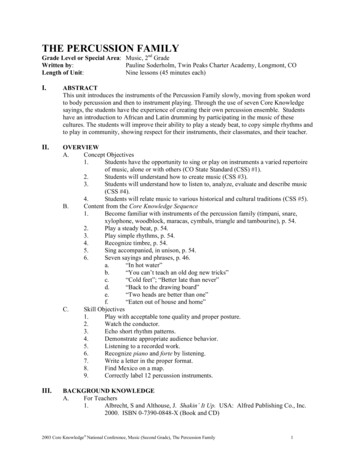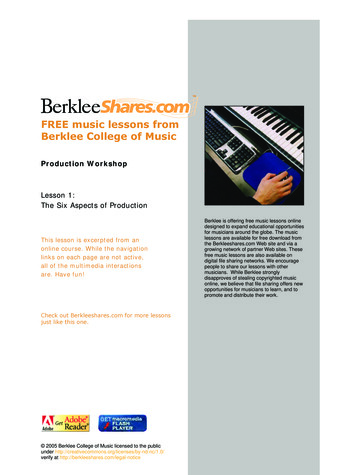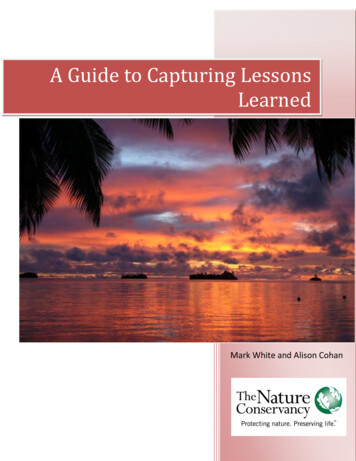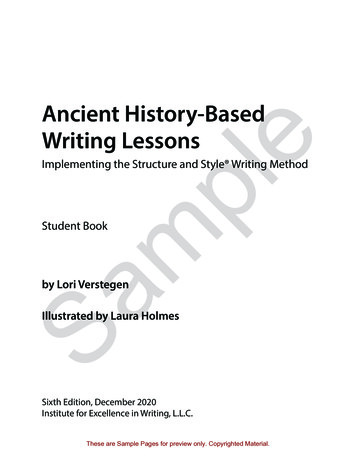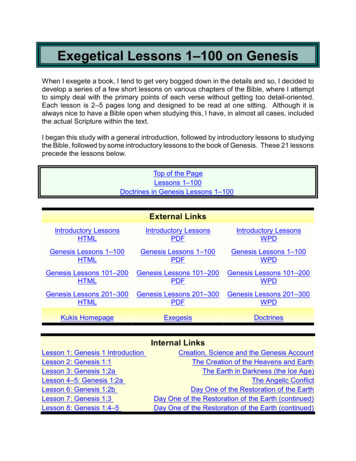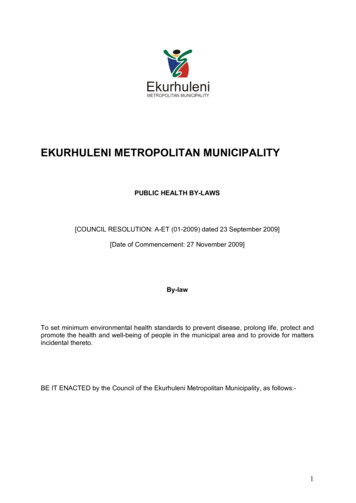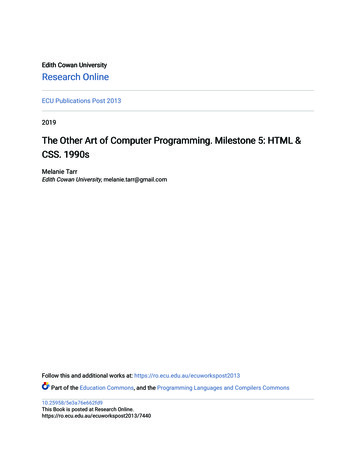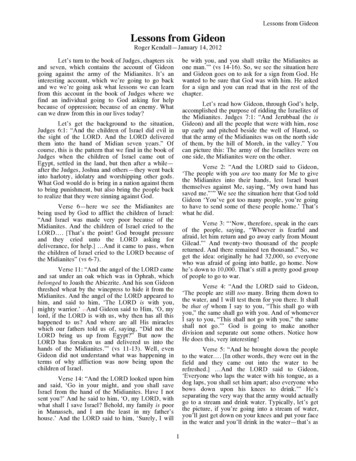
Transcription
fall 2013Lessons inPublic HealthHands-on learningprepares students forreal-world challengesof the 21st centuryfall 2013 Borderspublic health magazineFoege Fellows Turn 10 Stan Foster: Epidemiologist WithoutI
Dean, Rollins School ofPublic HealthJames W. Curran, MD, MPHAssociate Dean for Developmentand External Relations, RollinsSchool of Public HealthKathryn H. Graves, MEd,93MPHEditorPam AuchmuteyArt DirectorErica EndicottDirector of PhotographyBryan MeltzPhoto ContributorsAnn BordenTori CowgerKay HintonPaula StrassleVillage PhotographersEditorial ContributorsSally Wolff King 79G 83PhDCarol PintoYael D Sherman 08PhDKay TorranceCirculation and Finance ManagerCarol PintoPrint Production ManagerStuart TurnerExecutive DirectorHealth SciencesCreative ServicesKaron SchindlerAssociate Vice PresidentHealth SciencesCommunicationsVince DollardA First for Rollins and Saudi ArabiaFatima Al Slail made history during the RSPH diploma ceremony in May. Al Slail, a physicianand surgeon, was among the first cohort of King Abdullah Fellows from Saudi Arabia to graduate from Rollins. Classmates honored Al Slail by choosing her as their student speaker. “Weall came to this place with different stories and backgrounds, and we are all in public healthbecause we refuse to accept the world as it is now,” she told graduates and guests.LEARN MORE:Watch King Abdullah Fellow Fatima Al Slail address the Class of 2013 at Rollins.Visit bit.ly/fatima-rollins.Emory Public Health is published by the Rollins School of Public Health, a component of theWoodruff Health Sciences Center of Emory University (emoryhealthsciences.org). Please sendclass notes, observations, letters to the editor, and other correspondence to Editor, EmoryPublic Health, 1762 Clifton Road, Suite 1000, Atlanta, GA 30322, call 404-712-9265, or emailpam.auchmutey@emory.edu. To contact the Office of Development and External Relations,call Kathryn Graves at 404-727-3352 or email kgraves@emory.edu. Visit the Rollins Schoolof Public Health website at sph.emory.edu. To view past issues of the magazine, visit2public health magazinefall du.
fall 2013Generating Social DNAGraduates of the Foege Fellowship Program inherita passion for addressing the world’s greatest healthchallenges.88Lessons in Public HealthLearning in and outside the classroom prepares studentsfor public health practice in the 21st century.Contents514 Epidemiologist Without Borders5The impact of smallpox eradication pioneer and globalhealth teacher Stan Foster goes on and on.19 A Gift for TeachingEpidemiologist David Kleinbaum perpetuates innovationin the classroom and beyond.in every issueDean’s message . . . . . . . . . . . . . 2In Brief . . . . . . . . . . . . . . . . . . . . . 3philanthropy . . . . . . . . . . . . . . 181914ALUMNI NEWS . . . . . . . . . . . . . . . 21class notes . . . . . . . . . . . . . . . 22On the Cover Nadifa Mohammed andRachael Kane harvest food from theClarkston Community Center garden.Kane, a Rollins graduate, works to ensurefood security for residents of Clarkston,a few miles from Emory. To learn moreabout Kane, see the story on page 8.fall 2013public health magazine1
From the DeanPublic Health in the 21st CenturyAt Rollins, students immerse themselves in public health practice fromday one. Before their classes begin, first-year students divide into teamsand fan out across Atlanta to volunteer with more than 20 communityorganizations. These students are part of Rollinsteer Day, an annualtradition that brings them together to work collaboratively and learnabout the needs of the local community.Students often choose Rollins because of the many strong ties it haswith public health partners in Atlanta and around the world. Thesepartners afford students opportunities for hands-on experience beforethey graduate to ready them for public health practice in the 21st century.Our faculty are vital to preparing students for entry into the publicStudents often choose Rollinsbecause of the many strong ties ithas with public health partners inAtlanta and around the world. Thesepartners afford students opportuni-health workforce. Last spring, we celebrated the retirement of globalhealth professor and former CDC epidemiologist Stan Foster, whohelped lead the global effort to eradicate smallpox. We salute him inthis issue, along with David Kleinbaum, an award-winning teacher whohas created a gift to support faculty who teach advanced epidemiology.This year also marks the 10th anniversary of the William H. Foegeties for hands-on experience beforeFellowships in Global Health. To date, 24 fellows from 22 countriesthey graduate to ready them for pub-have benefitted from this program, funded by the Bill & Melinda Gateslic health practice in the 21st century.Foundation. All are mid-career professionals who share a passion foraddressing the world’s greatest health challenges, from improvingnutrition for mothers and children to preventing chronic and infectiousdiseases. And, like their fellow students at Rollins, they are influentialleaders in public health practice.James W. Curran, MD, MPHJames W. Curran Dean of Public Health2public health magazinefall 2013
The Heart of Public HealthHatcher Award honors school pioneer Eugene GangarosaAs Eugene Gangarosa tells it, hebegan his career in public healthat age 10. He entered the field byreading books about microbes andrelated topics while convalescingfrom rheumatic fever.Today, Gangarosa is considered a public health legend, bothas an expert and educator in theprevention of enteric diseases andas a visionary who believed thata school of public health couldthrive at Emory. For these achievements, Gangarosa received the 2013Charles R. Hatcher Jr. md Awardfor Excellence in Public Health.Gangarosa is the 11th recipient ofthe award, established by the schoolin 1996 to honor Hatcher for hisservice to and support of publichealth. Hatcher, a longtime cardiacsurgeon at Emory and the firstrecipient of the award, supportedcreation of the School of PublicHealth in 1990 during his tenure asvice president for health affairs anddirector of the Woodruff Health Sciences Center.“The school has grown enormously due to Gene’s vision and thesupport of Charles Hatcher,” notedDean James Curran during theaward celebration.Gangarosa began his career inearnest by helping rebuild the waterand sanitation systems in Naples,Italy, during World War II. Later, atthe Walter Reed Army Institute ofResearch, he defined the pathogenesis of cholera by studying patientsin Bangkok, Thailand. His workprovided the foundation for studiesby other investigators that led to thediscovery of oral fluid therapy, whichdrastically reduced infant mortality.He continued his research inintestinal pathophysiology inLahore, Pakistan, as director of thefall 2013In BriefEugene and Rose GangarosaUniversity of Maryland’sPakistan Medical ResearchCenter. In 1964, he joined theCDC, where he subsequentlyled the Epidemic IntelligenceService, the Enteric DiseasesBranch, and the BacterialDiseases Division. He retiredfrom the CDC in 1978 toserve as dean at the AmericanUniversity of Beirut, wherehe transformed a graduateprogram into an independentschool of public health. In1982, he joined Emory todirect the struggling masterof community health program. Working with WilliamFoege, then director of theCDC, and leaders at Emory, Gangarosa tripled enrollment by borrowing faculty from the CDC to teachand defining the curriculum moreclearly by renaming it as the masterof public health program.Gangarosa, now professor emeritus of international health, and hiswife, Rose, continue to play a roleat the school through the Centerfor Global Safe Water at Emory.Together, they created two endowedprofessorships—the Eugene J.Gangarosa Chair in Safe Water, heldby Christine Moe, and the complementary Rose Salamone Chair inEnvironmental Health, held byThomas Clasen, who joined Rollinsthis fall after serving on the facultyat the London School of Hygieneand Tropical Medicine.“The school would not be whatit is today without Gene, and Genewould not be who he is without hiswife, Rose,” said Curran. “They area remarkable couple. I realize howimportant you are as a team. Youaccomplish much together.”public health magazine3
In Brief4Tolbert Named Rollins Professorof Environmental HealthDuring the 20 years shehas been at Rollins, PaigeTolbert has built a nationalreputation as an expert inenvironmental epidemiology.This fall, Tolbert was nameda Rollins Professor to furtherher work in the field. She isnow one of several facultymembers who hold professorships, funded through theO. Wayne and Grace CrumRollins Endowment Fund.Tolbert has guided theDepartment of Environmental Health as its chair since2007. Under her leadership,the department has doubledin size, adding new faculty inareas critical to tackling theenvironmental health challenges of the future. Amongthem are bench scientistsconducting mechanisticwork on pathogenesis ofdisease, exposure scientistsdeveloping cutting-edgebiomarkers, public healthecologists using “big data”to study climate and otherglobal change, and researchers focused on global safewater and sanitation. Thedepartment recently introduced a doctoral programin environmental healthsciences and earlier this yearwas designated an Environmental Health SciencesCore Center by the NationalInstitute of EnvironmentalHealth Sciences.In recent years, Tolbertand her colleagues have ledpublic health magazinefall 2013a major study to examine the associations between air quality and emergency room visits to Atlanta hospitalsfor respiratory and heart problems. Shecurrently codirects the SoutheasternCenter for Air Pollution and Epidemiology in partnership with GeorgiaTech. Center researchers are using newapproaches to characterize ambient airpollution mixtures and determine therisks they pose to human health. Theresults of such studies help shape newpolicies and laws to safeguard health.Her new Rollins professorship willenable Tolbert to advance environmental health at the rsph, Emory,and beyond. “Resources and time arealways major constraints,” she says.“The Rollins professorship will giveme the flexibility to foster new lines ofresearch and pursue important departmental initiatives.”Paige TolbertRollins’ first dean begins new healthpost in TexasRaymond Greenberg, who served as the first dean of theRSPH, has joined the University of Texas System as executive vice chancellor for health affairs. Greenberg assumedhis new position in September after serving as president ofthe Medical University of South Carolina (MUSC).Prior to becoming president of MUSC in 2000, Greenbergserved as vice president for academic affairs. He joinedMUSC in 1995 after serving as dean of Rollins for five years. Raymond GreenbergDuring his tenure as RSPH dean, the school experienced rapidgrowth in enrollment, teaching, and research, leading to construction of a facility tohouse the school, the Grace Crum Rollins Building, which opened in 1995.As president of MUSC, Greenberg oversaw the physical expansion of the campusand doubling of annual funding for research and broadened statewide collaborationin research and patient care. In his new role, he oversees administrative and strategicoperations for the six academic health science institutions within the University ofTexas System.
GeneratingSocial DNAAyman El Sheikh’s impact on health changed dramatically after studying at Rollins. Before he enrolled,he worked as an electronics engineer with IBM andas an IT manager for Save the Children in Sudan. Aftergraduating from the rsph, El Sheikh returned to his homeland, where he helped the Carter Center set up a databaseto better track progress toward guinea worm eradicationand secured a 15.8 million grant from the Global Fundto Fight AIDS, Tuberculosis, and Malaria to strengthen thenation’s TB program. He now works in Namibia to ensurethat 300,000 schoolchildren are receiving proper nutritionthrough the United Nations World Food Program.Graduates of the Foege FellowshipProgram inherit a passion for tacklingthe world’s greatest health challengesBy Pam AuchmuteyThe Foege Fellowsduring their 10thanniversary reunion,their first meeting asa group.El Sheikh 05MPH is amongthe first students to benefitfrom the William H. FoegeFellowships in Global Health at Rollins. Now in its 10thyear, the program has enabled 24 mid-career professionalsfrom 22 countries to become more effective leaders in globalhealth. For the first time this fall, 21 alumni and current fellows met at Rollins to share their successes and challengesduring their 10th anniversary reunion. Deborah McFarland,director of the Foege Fellows Program, has mentored all ofthe fellows since the initiative began in 2003.“You are the ones on the frontlines of public health,”fall 2013public health magazine5
taking prophylactic drugsMcFarland told the felwhen they have no visiblelows. “We want you tosymptoms of disease.use this meeting time toMartin Swaka 05MPH ofshare the skills, philosoSouth Sudan is pushing tophy, and values that driverebuild an effective healththe health decisions yousystem following years ofmake to enhance trainingcivil war. In the process,for future generations ofhe has learned the valueFoege Fellows.”of engaging governmentHer comments echoedand nongovernmentalthe sentiments of Billpartners in creating a straFoege, the smallpox eraditegic development plan tocation pioneer and formerachieve common goals.CDC director for whomSuch a plan, Swaka said,the fellowships are named.“allows us to stay focusedA decade ago, Melindaon the noble public healthGates was instrumentalgoal of reducing morbidin creating the Foegeity and mortality.”fellowships by providingOther workshop paran endowment throughticipantschanged careerthe Bill & Melinda Gatespaths after completingFoundation, where Foegetheir fellowships. Roseserves as a senior fellow.Wanjala 11MPH, onceIn 2012, the foundationa laboratory scientist inprovided another grantKenya, now coordinatesto increase the number ofa multi-site study there tofellowships and sponsor adetermine the economicworkshop.and health benefits of“Through the centuries,sweet potatoes for moththere have always beeners and young children.shining lights—peopleGilbert Boredison 11MPHwho keep us on theShown with William Foege (clockwise, top left) are Mark Rosenberg of theTask Force for Global Health, John Hardman of the Carter Center, Helenetransitioned to the privateright path in this comGayle of CARE USA, and Patricia Simone of the CDC. Their partner agenciessector to advocate forplex world,” said Foege,nominate candidates for Foege fellowships each year.health and communityPresidential Distinguisheddevelopment with theProfessor Emeritus oflargest mining company in Madagascar. He oversees a 24International Health at Rollins. “It’s gratifying to see howmillion investment in projects to improve health, education,you have changed lives and how people treat one another.”and the livelihoods of people who live along the company’sAlso attending the workshop were top leaders from thepipeline route.CDC, the Carter Center, the Task Force for Global Health,After graduating from Rollins, Senkham Boutdara 08MPHCARE USA, and Emory, which nominate fellows for the proplanned to resume his career with CARE in Lao pdr. He optedgram each year.instead to become the senior policy officer with the Western“A lot of what happens in public health happens becauseAustralia Department of Health, where he is the first seniorof the passion of a few people,” said Patricia Simone, deputylevel person to address the health of Aborigines in the region.director of the Center for Global Health at the CDC. “TheBoutdara often uses what he learned at Rollins to guideFoege Fellows are part of that. You are changing the culturethe region’s 43,000 health system workers in implementationto address public health problems in a scientific way.”As the fellows well know, improving health in underserved of the 2011 National Health Reform Agreement. A primarygoal of the law is to close the gap in health disparities incountries is not an easy road. Sadi Moussa 05MPH, whopartnership with Aboriginal leaders and communities.comes from Niger and now serves in Mali, has worked with“To improve health, we have to learn more about Aborigi18 different ministers of health in 20 years. Herty Herjatinal people and involve them in helping us make better policy12MPH manages efforts to eliminate lymphatic filariasis anddecisions,” Boutdara said.control helminthiasis in Indonesia, where people often resist6public health magazinefall 2013
Building capacityAdrina Mwansambo is aphysician in Malawi, wherethe nation’s first case of AIDSwas confirmed in 1985. Whenher brother died of AIDS in1998, the drugs that couldsave him were unavailable intheir country.“I couldn’t save my brother’s life, but at least I coulddo something to make drugsaccessible to other people,”Mwansambo said. In 2001,she joined the National AIDSCommission, a newly restructured government programto address the health andsocial aspects of HIV/AIDSin Malawi. During the past10 years, the commissionhas increased dramaticallythe numbers of HIV testingsites, people on antiretroviraltherapy (ART), and women inprograms to prevent diseasetransmission from mother tochild.In the course of her work,Mwansambo has formednetworks to achieve commongoals. She returned to Rollinsto build more by connectingwith other Foege Fellows.“This is continuous capacitybuilding for us,” she said ofthe reunion.Like Mwansambo, VictorAkelo 14MPH has lost familymembers to AIDS. In Kenya,Akelo was a coinvestigatoron HPTN 052, the groundbreaking clinical study whichshowed that ART dramaticallyreduces HIV transmission inheterosexual couples. Whenthe successful results of thestill ongoing study were firstannounced in 2011, Akelofaced his own “baptism byfire” in explaining the resultsto media and others outsidethe scientific community.The Deborah A. McFarland Global FieldExperience FundSenkham BoutdaraThe Deborah A. McFarland Global Field Experience Fund hasbeen established by the generosity of an anonymous donorto honor her lifelong commitment to global health education.Gifts to the fund will support global field experiences,enabling students to conduct summer research worldwide.The donor has pledged to match gifts made before December31, 2013. Gifts to date include generous support from theFoege Fellows honoring their mentor.To learn more or make a gift, please contact Kathryn Graves,associate dean for development and external relations, at404-727-3352 or kgraves@emory.edu.Martin SwakaShahed RahmanWhen he completes his MPH degree next year, he willbe more versed in communicating science to others. “I’vegained added value from my courses by learning to translate science in ways that policy-makers and villagers canunderstand,” Akelo said.New Foege Fellow Shahed Rahman 15MPH arrived atRollins this fall in search of the same skills and more. Rahman, who serves as the national nutrition coordinator ofmaternal and child health for CARE Bangladesh, wants toexpand his ability to work in a more systematic way.“I want to learn how to better navigate and improvehealth systems,” he said. “My dream is to influence peopleand policies and translate knowledge more effectively formass populations to protect their health.”Next stepsAdrina MwansamboVictor AkeloAt the end of the workshop, McFarland asked the fellowsto suggest ways to strengthen the fellowship program. Theyoffered numerous ideas: Continuing education throughdistance learning. Adding courses in management and leadership to the fellowship. Serving as mentors to incomingfellows. Launching a collaborative research project. Connecting more with mentors at the CDC and other agencies.Helping fellows re-enter the workforce. And more.As alumni fellows prepared to return home and currentfellows began their RSPH classes, they did so armed withthe support and advice of leaders from their nominatingagencies. Helene Gayle, president and CEO of CARE USA,encouraged the fellows to spread their “social DNA”—aterm often used by Bill Foege—throughout the world.“How do we use our experience to address poverty,malaria, or polio?” she asked. “Each of us has a responsibility to use what we know and take it to the next level. It’slike a relay race—taking the baton and moving forward. Ifind hope and inspiration from being here with you.” fall 2013public health magazine7
in the community. AlekShybut found his niche atthe RSPH after serving withTeach for America in Seattle.He is preparing for PeaceCorps service as a studentin the Master’s Internationalprogram. Here he assistsnew students preparing totake part in Rollinsteer Day,the school’s annual day ofcommunity service.l esson si n Pu b l ic Hea lt hB y P am A uchmutey8public health magazinefall 2013Hands-on learningprepares students forreal-world challengesof the 21st century
. or in the classroomWhichever department theymay choose, Rollins studentslearn skills and methods in theclassroom to solve real-worldproblems. Many gain practicalexperience by working withpractitioners and scientistsat the CDC and other publichealth partners throughoutAtlanta and the state ofGeorgia.In Atlanta today,the average monthly food bill for afamily of four is 754. That’s 86 morethan the 668 maximum monthlybenefit a family of four receives forfood stamps. Georgia now ranks sixthnationally in the number of food stamprecipients, up considerably from 15thplace in 2007 before the economicrecession occurred late that year.Such statistics hit close to home,not only for Georgia families but alsofor public health practitioner RachaelKane 13MPH, who manages a weeklyfarmer’s market for the refugee, immigrant, and American-born families inClarkston, Georgia, just a few mileseast of Emory. Her student experiencesin and outside of the classroom at Rollins qualified her for the role.While taking a directed study courseon food policy and security, Kane andother students limited themselves to 200 a month for food—the sameamount allotted to an individual forfood stamps. “You realize firsthandthat cheap food is not good food,” saysKane, who received a 2013 Humanitarian Award from Emory last spring.During her first year at Rollins, sheapplied for a position through theschool’s Emory Public Health TrainingCenter and began working with theClarkston Community Center, whereshe developed a food cooperativeinvolving local churches and organizations. That led to a summer internshipin Clarkston, where she partnered withGlobal Growers Network, a projectthat teaches refugee farmers how togrow and market vegetables and fruitsthat thrive in the Georgia climate, andBurundian women who tend a localfarm in Decatur, Georgia, to growproduce to feed their families andsell locally. She continued working inthe Clarkston community during hersecond year of study, this time throughthe Rollins Earn and Learn program,which provides students with paidwork experiences in public health.This past summer, Kane and KatieClifford, a second-year MPH studentand president of the Rollins StudentGovernment Association (rsga), beganto assess the Clarkston CommunityCenter’s food security initiatives andother local food sources. They usedskills they learned at Rollins to developa survey and collect and analyze data.“We want to know more about howeffective the programs are in eradicating hunger and food insecurity,” saysKane. “We also want to find ways tobring more refugees and nonrefugeestogether to further strengthen the community in Clarkston.”Working with communities andpopulations is the bedrock of publichealth education at Rollins. The schoolgrew up next to the CDC, regarded byfall 2013public health magazine9
many as the mecca for applied public health.“Our founding fathers came from the CDC, state government, DeKalb County, and the city of Atlanta,” says KathyMiner 79MPH, associate dean for applied public health. “Itwas instrumental to have this nexus of people and agenciescome together. Along the way, we formed new relationshipswith the Carter Center, CARE International, the AmericanCancer Society, and otherpartners who were attracted bywhat Emory and Atlanta had tooffer.”A curriculum evolution“We want to knowmore about howeffective the programsare in eradicatinghunger and foodinsecurity”— R achael K a n e 1 3 M P H10public health magazinefall 2013In recent years, some U.S.schools of public health haveexamined their curricula torethink how to better preparestudents for public healthpractice in the 21st century.Older schools like those atJohns Hopkins, Harvard, andColumbia universities evolvedin a different era of publichealth in the early 20th century. They followed a model setforth in the Welch-Rose Reportof 1915, which recommendedpublic health education forprofessionals trained in medicine and hygiene. When Emoryestablished the School of PublicHealth in 1990, the MPH degreehad become the avenue to public healthpractice for professionals with baccalaureate degrees.Since 2011, Rollins has had thehighest number of MPH applicants inthe nation and also ranked first in thenumber of MPH applicants in globalhealth, epidemiology, and environmental health. What then makes the rsphstand out?Like other schools accredited by theCouncil on Education for Public Health,Rollins requires its students to takecore courses in five areas: behavioralsciences, biostatistics, epidemiology,environmental health, and health policy.Two years ago, the RSPH added a sixthcore course developed by faculty in theHubert Department of Global Health.“The course has been a tremendousaddition,” says Carlos del Rio, HubertProfessor and department chair. “Themost important thing is that studentslearn to speak the language of globalhealth. Global health is not a discipline.It’s an approach. It’s a way of thinking about and working on problems.Teaching students to think that way isimportant in this globalized world welive in.”“The new world of public health isabout cooperation and collaboration,”he adds. “It requires us to think horizontally across disciplines to provide measurable outcomes to improve health.”Whether students choose to majorin global health or another core area,all have multiple opportunities to gainpractical experience in and outside ofthe classroom. As students, faculty, andalumni attest, hands-on learning is Rollins’ forte.“You can learn about public healthanywhere,” says Kristin Unzicker02MPH, director of leadership andcommunity engaged learning. “But ifyou want to do public health, you cometo Rollins.”Worlds of experienceAfter graduating from the University ofNebraska–Lincoln, Alek Shybut 14MPHdid marketing for a small communitybank and quickly learned the businessworld wasn’t for him. “I wanted to dosomething more service-based and lookfor a way to open up my soul,” he says.His realization led him to Seattle,where he served two years with AmeriCorps as a counselor to middle schoolstudents. The experience immersed himin community service and piqued hisinterest in mental health and healtheducation. While in Seattle, Shybutapplied to the Peace Corps, followingin the footsteps of his father, a formerPeace Corps volunteer in Malaysia.He also applied to the rsph Master’sInternational program, which preparesstudents for Peace Corps service.Now a second-year student at Rollinsand vice president of the rsga, Shybut
More than 70 students conduct research in othercountries each summer through the GlobalField Experience program. Left: This year, PaulaStrassle conducted a study on water qualityand sanitation practices in Malawi. Below: ToriCowger led the epidemiological investigation ofa small outbreak of typhoid fever in AmericanSamoa. Both of their projects helped addresshealth issues that affect young children.has spent numerous hours learningand working in the community. Lastyear, he volunteered with the Centerfor Pan Asian Community Services totutor elementary school students inEnglish. His students lived in a motelapartment complex in Clarkston. Healso secured a field placement throughthe Emory Public Health TrainingCenter to coordinate the CommunityHealth Ambassador (CHA) program atGood Samaritan Health Center in WestAtlanta. Founded by former Rollinsstudent Julie Straw 12MPH, the CHAprogram helps teens learn to recognizeand address health issues among theirpeers.This past summer, Shybut completeda practicum in Orange County, California, at Grandma’s House of Hope,which provides services for youth andhomeless women. His practical experiences and his coursework have provedinvaluable. “I need that combinationof classroom training and communityinteraction,” Shybut says. “It allows meto see the faces of those I am serving.”Lessons in the fieldEpidemiology major Tori Cowger14MPH didn’t plan to make headlinesduring her summer practicum in American Samoa. When the island experienced a small outbreak of typhoid fever,Cowger led the epidemiology investigation since the main surveillance officerwas off-island at a conference. At thetime, the outbreak was limited to threecases, and island health officials urgedresidents to take precautions in consuming food and water to prevent morecases of the disease, especially amongyoung children.“It felt like I was living a real-lifecase study like in EPI 540,” wrote Cowger in an email to her adviser, epidemiology professor John McGowan, fromAmerican Samoa. “We even made newsin the local newspaper.”Cowger is one of the many Rollinsstudents who conduct research in othercountries each summer through theGlobal Field Experience (GFE) program.Supported by three endowments—theEugene J. Gangarosa Scholarship Fund,the Anne E. and William A. FoegeGlobal Health Fund, and the O.C.Hubert Fellowships in InternationalHealth—the GFE program enablesstudents to plan, develop, and implement research projects by working withhealth partners in different cultur
2 public health magazine fall 2013 13-RSPH-DEVEL-0001 Emory Public Health is published by the Rollins School of Public Health, a component of the Woodruff Health Sciences Center of Emory University (emoryhealthsciences.org). Please send class notes, observations, letters to the editor, and other correspondence to Editor, Emory Public Health, 1762 Clifton Road, Suite 1000, Atlanta, GA 30322 .


